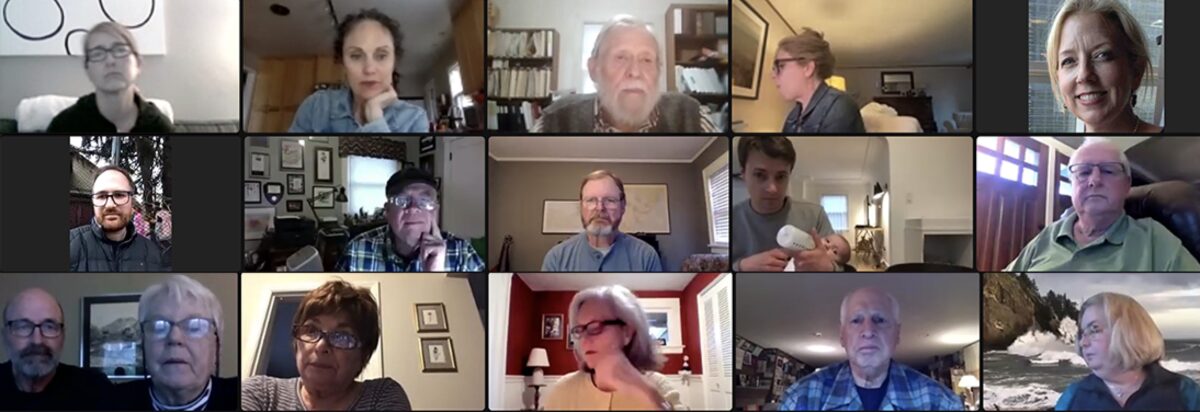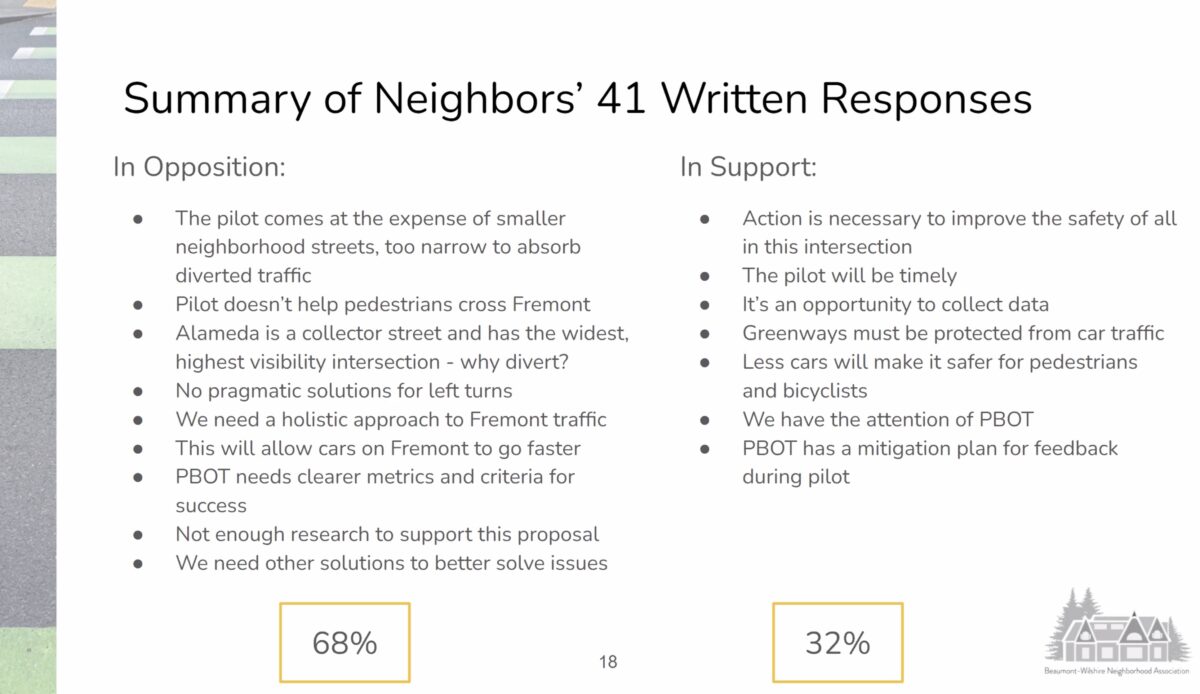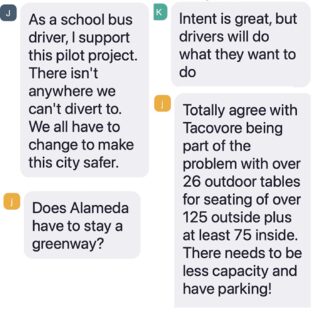Cycling News & Blog Articles
Beaumont-Wilshire neighborhood board votes against PBOT pilot traffic safety project
At a meeting of the Beaumont-Wilshire Neighborhood Association Monday night, board members voted against a City of Portland traffic safety pilot proposal.
“We don’t want to be blocked from going straight to go to New Seasons [Market], to go visit friends, to go to work, to turn left.”
— neighborhood resident
On the table was a plan vetted by the Portland Bureau of Transportation that would collect traffic data at 10 locations around the notoriously dangerous and busy intersection of NE Fremont and Alameda. After collecting data, PBOT would share results with the neighborhood and then install a diverter on Fremont that would prevent auto users from crossing or making left turns onto the street from Alameda. The diverter would be installed this summer with temporary materials while PBOT continued to collect data to analyze its impacts.
Despite unanimous acknowledgment that something needs to be done, the project was voted down 7 to 4.
Last night’s special meeting was called specifically to discuss this proposal after the neighborhood has rallied to improve safety on Fremont following a crash in December where a woman was hit and killed by a driver trying to cross at NE 44th.
There were about 70 people logged into the virtual meeting and according to BWNA veterans, it was the largest turnout and most heated dialogue on an issue they could ever recall. This decision has attracted so much attention for two main reasons: 1) It involves something (a diverter) that might make it less convenient to use a car and 2) PBOT gave BWNA board members the impression that their vote would be the deciding factor. Board member Tim Gillespie said at the outset: “We have been given the indication from PBOT that they really want our approval before they move ahead.”
Previous BWNA meetings have been attended by top PBOT traffic safety staff and board members at last night’s meeting said they’ve had conversations with Portland’s chief traffic engineer Wendy Cawley. Board members have been given tremendous access to city staff, but many framed their opposition by saying they want more data and more plan options to consider before giving PBOT their approval to move forward.
Advertisement
Before discussion of the proposal, board members shared a presentation that described PBOT’s intent and made the case for why they focused potential changes at Fremont and Alameda. In a nutshell; the intersection has a history of crashes, a large number of people drive too fast on Fremont, and Alameda is a north-south neighborhood greenway route that currently has nearly twice the amount of car traffic on it than it should have in order to stay below PBOT’s volume threshold for a “low-stress, family-friendly” street.
One of most consequential slides in the presentation shared results of written feedback the board had received from 41 people (above). The slide showed that of those 41 people, 68% opposed the pilot project proposal and just 32% supported it. Many meeting attendees who opposed the pilot felt this unscientific and tiny sample of responses from a neighborhood with about 6,000 people in a city of 650,000 people should be enough to end the debate.
One board member wrote in the chat that, “If almost 70% of the comments were against the pilot then the board should represent the community. No???”
“If almost 70% of the comments were against the pilot then the board should represent the community. No???”
— meeting attendee via Zoom chat
During testimony and chat messages shared during the virtual meeting, the only thing everyone agreed on was that Fremont and Alameda are currently unsafe and something needs to be done to make it better.
However, like we’ve seen when this exact issue has come up in many other neighborhoods, people tend to get very concerned when there’s a possibility their use of a car might become less convenient. There is also a significant level of distrust and reflexive opposition to projects like this whenever some people perceive PBOT is doing something to support cycling over driving. Others felt PBOT simply called it a “pilot” to sneak in something they never intend to remove once installed.
It was notable to me as an observer that several people based their opposition on the fact that they perceived the PBOT proposal as being only intended to improve the neighborhood greenway on Alameda. “The diverter pilot doesn’t address intersection safety at all, it’s designed to support the Greenway,” one person shared in the chat. People were so opposed to the idea of a diverter that they couldn’t fathm steps to improve the greenway would also result in safer conditions on Fremont. Much of the opposition also centered around a confounding misperception that a full diverter and a bunch bright plastic candlestick wands would do nothing to decrease speeding on Fremont or make crossing of the street safer.
“Just to be clear,” read one chat message. “The proposal is intended to control vehicle traffic away from Alameda with candlesticks. Not improving the pedestrian safety.”
Many other people framed their opposition by saying they wanted to see more data before moving forward. This is despite the proposal clearly stating that PBOT would collect more data and ask the neighborhood to weigh in on that data before the diverter installation.
Advertisement
“We have been given the indication from PBOT that they really want our approval before they move ahead.”
— BWNA board member
“We don’t make decisions based on neighborhood association votes.”
— Hannah Schafer, PBOT
Other people who spoke out against the plan made it clear they were concerned how their personal convenience would be impacted. Here’s revealing testimony from one man who lives near the corner of the intersection:
“This is going to really directly impact me and my family in ways that may not impact other people… I hate to put my convenience above everyone else, and that’s not my intent, but the tradeoff is people living in that area are really going to have to deal with it disproportionately on a day-to-day basis. When I’m coming home from work, I don’t want to drive on a gravel street on 38th, I just want to be able to take a left turn and come home and not have to deal with this. I understand your safety is the issue. But I also want to say this is going to have a real impact on the people who live here.”
Another woman echoed that sentiment when she said, “Many of us who live right down the street don’t want to be blocked from turning left. We don’t want to be blocked from going straight to go to New Seasons, to go visit friends, to go to work, to turn left.”
Another major reason for opposing the diverter plan was something we’ve heard countless times before: Concerns that all the drivers would just clog up other small, residential streets. “We are trying to protect our neighbors. We are worried kids and residents on smaller streets will be injured with this,” one person wrote in the chat. “I am for greenways, commuting by bike or public transportation, fewer car trips, committed walker, etc.,” another person wrote. “This action is just going to take cars from one area and put them on smaller streets, not lessen the number of cars or increasing safety for all.”
There were several board members who voted no but who seemed committed to finding a different solution. One of them said, “We want safe areas for people to bike and walk and drive. And so [PBOT] is not going to go away. So I feel really like feel comfortable not supporting the pilot as proposed but committing to work as a team with city to come back with something that reflects listening to the community that put some thought into how we can have a win-win solution.”
And while they were a minority at the meeting, several folks expressed clear support.
One woman who lives on the corner said, “I support it because we have to try something. I can’t tell you how many times we rush out of our house because we’ve heard screeching tires, we’ve had cars turned-over on our corner, we’ve had you know bicyclists have been hit.” Bike Loud PDX Board President Kiel Johnson spoke up to say, “Fremont is supposed to have bicycle infrastructure, but it doesn’t. If we’re not going to put the bike infrastructure on [larger, neighborhood collector streets like] Fremont and Prescott we need to do all we can to make sure that these greenways are as safe as they can be.”
Another person who bike commutes through the intersection regularly said she supports the diverter because, “I’ve just had a lot of scary encounters with cars at that intersection.”
And one of the four BWNA board members who supported the project said, “I think environmental concerns trump a lot of other issues. If we don’t start moving in that direction, just more and more buildings and more and more cars, we’re never going to get to a solution.”
For their part, PBOT says the neighborhood board might have the wrong idea about the power of their vote. “We never communicated that their decision was going to be the deciding factor on the diverter… we don’t make decisions based on neighborhood association votes,” said PBOT Interim Communications Director Hannah Schafer in a phone call this morning. “We aren’t even done with the public outreach process. Taking this to a vote was a decision that they made but that we were not a part of.”
Schafer said last night’s BWNA vote, “Is their opinion.”
“We want to be in touch with neighbor associations,” she continued. “But they do not make the final decision on if — or what — we install to create safer streets.”
Schafer says they will take the board meeting into account as they continue to develop and analyze potential solutions in the future. Stay tuned for opportunities to weigh in.
![]()
Jonathan Maus is BikePortland’s editor, publisher and founder. Contact him at @jonathan_maus on Twitter, via email at This email address is being protected from spambots. You need JavaScript enabled to view it., or phone/text at 503-706-8804. Also, if you read and appreciate this site, please become a supporter.




